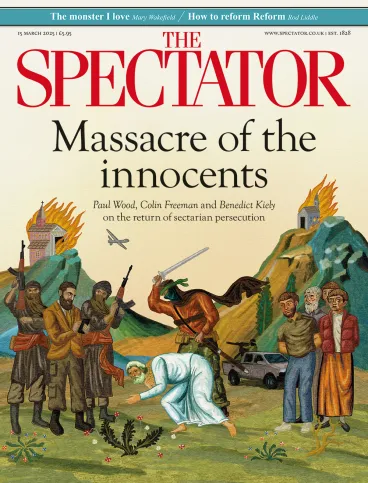
Tony Blair’s former spin doctor Alastair Campbell has many talents. But his understanding of Middle Eastern politics leaves much to be desired. Last month he welcomed Syria’s new leader Ahmed al-Sharaa on to the podcast he hosts with the former Conservative minister Rory Stewart. Reflecting on the encounter afterwards in a newspaper column, Campbell was anxious to give the ‘gently smiling President’ the benefit of the doubt. He was ‘definitely saying a lot of the right things’. There was, Campbell acknowledged – ‘one big blot on the Syrian landscape’ – the ubiquity of men smoking. But otherwise everything seemed in order. It was the case, he said, that ‘virtually everyone you meet says that they feel happier than they did under [Bashar al] Assad’.
Today, perhaps, not so much. Last week, al-Sharaa’s jihadist supporters unleashed a two-day killing spree in western Syria. They torched houses and filmed themselves moving from home to home, hunting for victims. As Paul Wood reports in the magazine, hundreds of innocents from the minority Alawite community were slaughtered. The man most likely to be responsible for ordering the massacre, Abu Amsha, was an ally of al-Sharaa and was with the new Syrian leader when he proclaimed victory in Damascus last year. Abu Amsha was not simply there to bask in the warmth of the leader’s gentle smile. He was rewarded with the post of brigadier-general in the new Syrian army.
The al-Sharaa regime proclaims, officially, that it will investigate the killings and points to fighting from Alawites loyal to Assad as a destabilising factor. But the killing of the Alawites is not the only cause for concern in Syria. As Father Benedict Kiely writes elsewhere, since al-Sharaa’s government seized power, Syrian Christians have been the victims of harassment, violence and terror. The constitution which the new Syrian President is drawing up will entrench Islamist power.
When Campbell and Stewart hobnobbed with the ‘fighter turned President’, they knew HTS were jihadists, proscribed as a terrorist organisation by the United Nations. They knew, too, that al-Sharaa had joined al Qaeda to fight the West in Iraq. Yes, he had tried to distance himself from Islamic State, put on a suit, and said he wanted to place delivering public services ahead of enforcing doctrinal purity in Syria. But he was no bland, conciliatory technocrat. He was still an Islamist, leading an army of extremist militants.
The BBC and CNN also swallowed al-Sharaa’s tale of converting his attentions from slaughtering kafirs to collecting bins on the road to Damascus. His foreign minister received rave reviews at Davos for presenting his boss as the Levant’s answer to Singapore’s Lee Kuan Yew. Too many dared to believe that centuries of sectarian tensions could be erased by a few comforting words about inward investment.
The naive faith that terrorists can be talked into becoming democrats is a besetting sin of the liberal mindset. The truth is that Islamist terror, far from fading into the past, is an evolving and resurgent threat. As Gerry Adams once said of the IRA: ‘They haven’t gone away, you know.’
There are new theatres where jihadists operate, and new threats they pose. Take the beheading of 70 Christians last month at the hand of the Congolese chapter of IS. As Colin Freeman also reports, this episode follows a year of intensified attacks on Christian communities across the country. More than 600 were killed between January and June last year alone, according to one report. Kidnappings, rapes and mutilations are common.
There is a tendency in the West to avert our gaze when the black flag of Isis flutters over mutilated corpses
Because of the region’s remoteness, the horrors in the Congo have not received the western attention they deserve. As Freeman highlights, the past decade has seen a rapid expansion of Islamist extremism across sub-Saharan Africa. Even as the region has sent tens of thousands of people surging towards the Mediterranean, the nature of the Islamist violence fuelling these movements has attracted little comment.
That is why The Spectator is devoting coverage this week to the atrocities being inflicted on Alawites, Druze and Christians at the hands of Islamists. The tendency in the West to avert our gaze when the black flag of IS flutters over mutilated corpses in the Middle East and Africa is a mistake. It is not just that this persecution is a moral affront – it is also the case that the ideology that animates these killers is a threat to us all.
Europe has suffered at the hands of Islamist terrorists in recent years. Many of the attacks were inspired by IS: Paris, Brussels, Nice, Marseille, Manchester, Strasbourg, London, Vienna, the list goes on. In Britain, we have avoided an attack on the scale of the 7/7 or Manchester Arena bombings for several years, but that is only because of the efforts of our security services. Last year alone, counter-terror police foiled two Islamist plots that would otherwise have led to mass casualties.
The state’s ability to continue to respond effectively will, however, only be hampered by the government’s ongoing attempts to ban ‘Islamophobia’, which in effect will restrict the discussion of extremism and how to counter it. Only by reporting on the nature of Islamist violence, understanding the ideology behind it, and remaining clear-eyed about these continuing threats can we prevent more innocents being massacred.








Comments